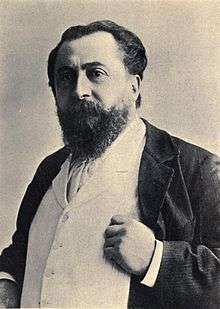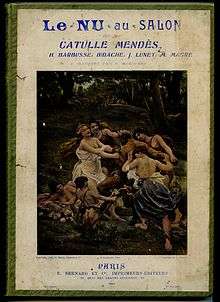Catulle Mendès
| Catulle Mendès | |
|---|---|
 | |
| Born |
22 May 1841 Bordeaux, France |
| Died |
8 February 1909 (aged 67) Saint Germain, France |
| Occupation | Poet |
| Genre | Poetry |
| Literary movement | Parnassianism |
| Spouse | Judith Gautier |
| French literature |
|---|
| by category |
| French literary history |
| French writers |
|
| Portals |
|
Catulle Mendès (22 May 1841 – 8 February 1909) was a French poet and man of letters.
Early life and career
Of Portuguese Jewish extraction, Mendès was born in Bordeaux.[1] After childhood and adolescence in Toulouse, he arrived in Paris in 1859 and quickly became one of the proteges of the poet Théophile Gautier. He promptly attained notoriety with the publication in the La Revue fantaisiste (1861) of his Roman d'une nuit, for which he was condemned to a month's imprisonment and a fine of 500 francs. He was allied with Parnassianism from the beginning of the movement and displayed extraordinary metrical skill in his first volume of poems, Philoméla (1863). His critics have noted that the elegant verse of his later volumes is distinguished rather by dexterous imitation of different writers than by any marked originality. The versatility and fecundity of Mendès' talent is shown in his critical and dramatic writings, including several libretti, and in his novels and short stories. His short stories continue the French tradition of the licentious conte.
Private life
In 1866 Mendès married Judith Gautier, the younger daughter of his mentor Théophile. They soon separated, and in 1869 he began cohabiting with the composer Augusta Holmès with whom he had five children. The couple parted in 1886, and he later married the poet Jeanne Nette, who was to be his last companion.[2]
Death
Early on the morning of 8 February 1909, the body of Mendès was discovered in the railway tunnel of Saint Germain. He had left Paris by the midnight train on the 7th, and it is supposed that, thinking he had arrived at the station, he had opened the door of his compartment while still in the tunnel, although some biographers have suggested suicide. His body was interred at the Montparnasse Cemetery.[2]
Works
Collections of poetry
- Philoméla (1863)
- Poésies, première série (1876), which includes much of his earlier verse
- Soirs moroses, Contes épiques, Philoméla, etc.; Poésies (7 vols., 1885), a new edition largely augmented
- Les Poésies de Catulle Mendès (3 vols., 1892)
- La Grive des vignes (1895)
For theatre
- La Part du roi (1872), a one-act verse comedy
- Les Frères d'armes (1873), drama
- Justice (1877), in three acts, characterized by a hostile critic as a hymn in praise of suicide
- Le Capitaine Fracasse (1878), libretto of a light opera, based on Théophile Gautier's novel
- Gwendoline (1886) and Briséïs (1897), for the music of Chabrier
- La Femme de Tabarin (1887)
- Isoline (1888), for the music of Messager
- Médée (1898), in three acts and in verse
- La Reine Fiammette (1898), a conte dramatique in six acts and in verse, set in Renaissance Italy, later set to music by Xavier Leroux, for which see: La reine Fiammette
- Le Cygne (1899), for the music of Lecocq
- La Carmélite (1902), for the music of Reynaldo Hahn
- Le Fils de l'étoile (1904), the hero of which is Bar Kokhba, the Syrian pseudo-Messiah, for the music of Camille Erlanger
- Scarron (1905)
- Ariane (1906) and Bacchus (1909), for the music of Massenet
- Glatigny (1906)
Critical works

- Richard Wagner (1886)
- L'Art au théâtre (3 vols; 1896–1900), a series of dramatic criticisms reprinted from newspapers
- A report addressed to the minister of public instruction and of the fine arts on Le Mouvement poétique francais de 1867 à 1900 (new ed., 1903), which includes a bibliographical and critical dictionary of the French poets of the 19th century.
Novels
- Zo'har (1886), a story of incest in which the woman is virile and the man is feeble
- Le Roi vierge (1880) in which he introduces Louis II of Bavaria and Richard Wagner
- L'Homme tout nu (1887)
- La Maison de la vielle (1894)
- Gog (1897)
References
- ↑ "Mendès, Catulle". JewishEncyclopedia.com. Retrieved 2013-12-13.
- 1 2 "Biografía de Catulle Mendès". Iesxunqueira1.com. Retrieved 2013-12-13.
External links
| Wikimedia Commons has media related to Catulle Mendès. |
| French Wikisource has original text related to this article: |
- Works by Catulle Mendès at Project Gutenberg
- Works by or about Catulle Mendès at Internet Archive
- Works by Catulle Mendès at LibriVox (public domain audiobooks)

- Wagnerian Discord Echoed, The New York Times, June 10, 1894
- Web site in Spanish of Catulle Mendès